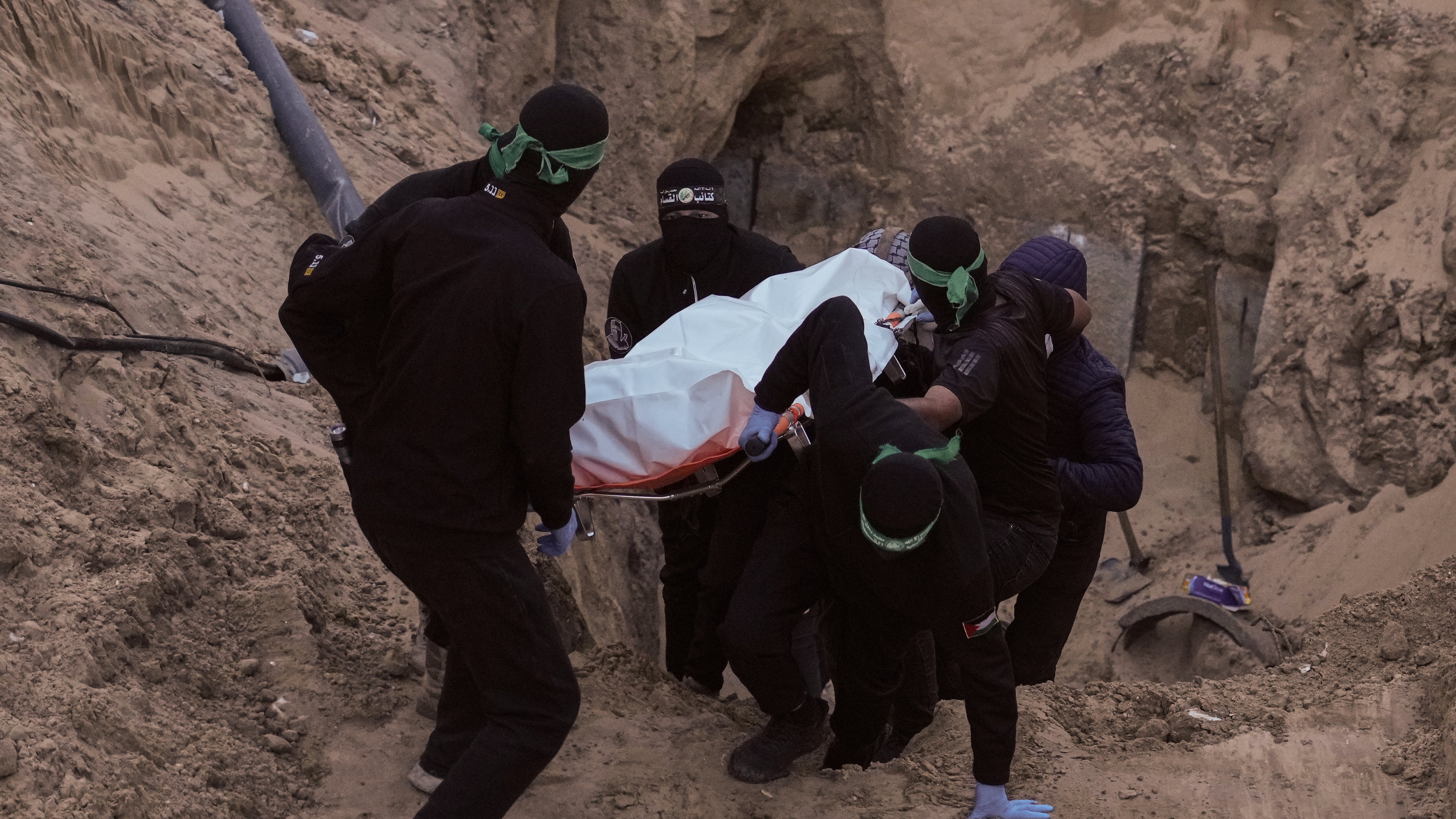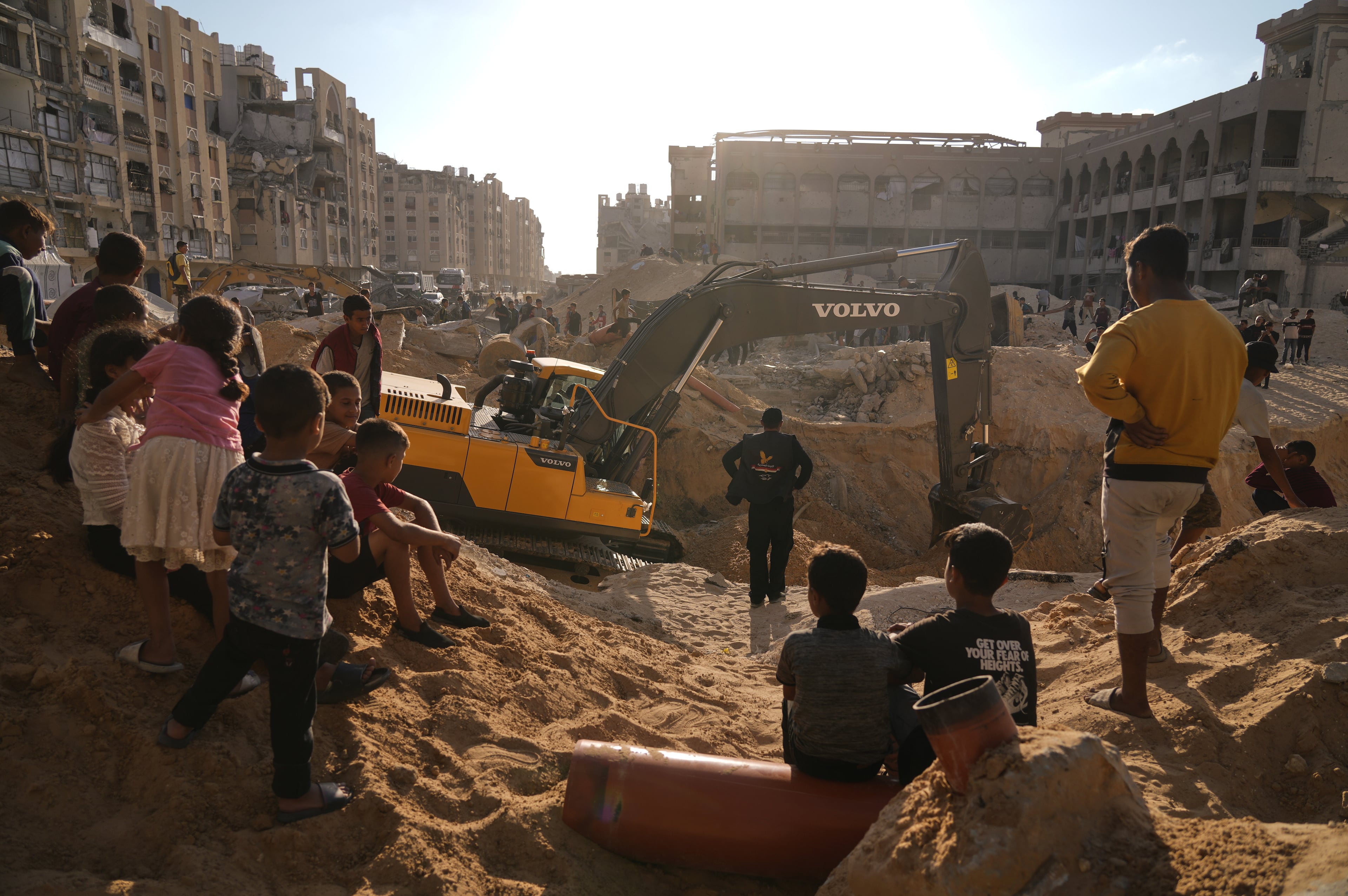Slow release of hostage bodies threatens Gaza ceasefire and deepens families' heartbreak

TEL AVIV, Israel (AP) — The announcement Monday that Hamas had released the body of another hostage offered hope to 13 families and an Israeli public desperately waiting for the remains of loved ones to come back from Gaza.
Then came word that the militant group had returned only partial remains from a hostage who was recovered by Israeli troops nearly two years ago. That brought fresh heartbreak to the families of the hostages whose bodies are still somewhere in the devastated Palestinian territory.
More than two weeks after the start of a ceasefire in the Israel-Hamas war, the families are enduring a terrible waiting game in the quest to lay their relatives to rest. The slow return of remains is the most immediate threat to the truce that began Oct. 10, and it's a sensitive issue for the Israeli public, which places religious and cultural importance on retrieving bodies for burial in Israel.
Orna Neutra, the mother of an Israeli-American soldier who was killed in the Hamas-led attack on Oct. 7, 2023, and whose body was taken by Hamas, said her family longs for the closure of bringing her son Omer home.
“This is my son,” she said Monday in Tel Aviv. “We need that concreteness. We visited some of the families that did receive their loved ones back, and they shared with us some of the intimacy of receiving the body, actually seeing it, and how it felt for them. And I can say, as Omer’s mother, that I really need that.”
The U.S.-brokered ceasefire was under new pressure Tuesday, when Israeli Prime Minister Benjamin Netanyahu said he ordered the army to carry out new “powerful strikes” in Gaza, and Hamas responded by saying it would delay handing over what they claimed was another hostage body.
As part of the ceasefire, Hamas released 20 living hostages earlier this month in exchange for nearly 2,000 Palestinian prisoners and detainees. Militants also released the remains of 15 hostages.
Hamas says it has not been able to reach all of the remains because they are buried under rubble from Israel’s two-year offensive in Gaza. Israel has accused the militants of dragging their feet and threatened to resume military operations or withhold humanitarian aid if all of the remains are not returned.
This week, Hamas said it expanded its search for hostage bodies into new areas of Gaza. Egypt has also deployed a team of experts and heavy equipment to help retrieve bodies.
Meanwhile in Gaza, Palestinian families are also struggling to identify bodies that were returned by Israel as part of the ceasefire. Thousands of Palestinians from Gaza are still missing, possibly buried under the rubble or in Israeli hands.
Family believed for 14 months that son was alive
Omer Neutra, 21, was born and raised on Long Island, New York, and moved to Israel to enlist in the military as a volunteer. He was serving as an officer on the Gaza border and was abducted with the rest of his tank crew. He and two others were killed. One soldier survived and was released after two years in captivity.
Neutra’s parents made 40 trips to Washington to lobby for their son, appeared regularly at protests in the U.S. and Israel and addressed the Republican National Convention last year. For more than a year following the Oct. 7 attack, they believed Omer was still alive. After 14 months, they received word from the military that intelligence indicated Omer was killed during the 2023 attack.
“It’s not based on any forensic evidence. It’s based on some intelligence, and it’s very hard to reconcile that,” Omer’s mother said.
Watching the return of the 20 living hostages reminded Omer's father, Ronen Neutra, of the Israeli saying “to cry with one eye and smile with the other.” On the one hand, it was “miraculous” that all of the living hostages were released in a single day, Ronen said. But the family also knew there would be no joyful reunion for them.
Orna Neutra did not expect waiting for her son's body to be the hardest part. The agonizing pace at which the bodies are being returned is a new type of torture, she said.
“You crave this closure,” she said. “But we know that it’s going to also trigger grief that that’s being held back in two years of fighting.”
Return of bodies is essential for grieving
For hostage families that have received the remains of their loved ones, Dr. Einat Yehene, the head of rehabilitation for the Hostages Families Forum, urges them to spend time with the body, even to touch it.
“Some came back recently with clothing. Some were only bones. Some were only parts of remains, fragmented pieces. It’s very devastating,” Yehene said.
The return of the bodies is essential to try to provide some kind of relief to the “disrupted bereavement,” a unique type of loss where families are frozen in grief and surrounded by questions.
“Parents are burying someone who they didn’t see for two years,” Yehene said. Being close to the bodies provides “this sense of concreteness," and the physical proximity offers a chance to say goodbye, she said.
Palestinian families in Gaza are going through similar anguish as they attempt to identify the remains of bodies Israel has returned.
Under the ceasefire deal, Israel agreed to return 15 dead Palestinians for each body of a dead hostage, but Israel gives no identification for the bodies and does not allow DNA-testing material into Gaza.
Gaza Health Ministry officials said many of the bodies appear to be fighters or others killed during the Hamas-led attack on Oct. 7, 2023, and following days. Israel has released bodies of 195 Palestinians but only 75 have been identified, according to the ministry, which is part of the Hamas-run government.
Judaism and Islam call for immediate burial
In Judaism and Islam, the expectation is for immediate burial after death. Among Jews, the practice is traced to a line in Deuteronomy instructing followers not to leave a body out overnight but to bury it the same day.
The Israel is still fighting for the remains of Eli Cohen, a spy killed in Syria in 1965, and Ron Arad, an Israeli aviator missing since his plane was shot down over Lebanon in 1986. Both are household names in Israel. One of the 13 waiting families is that of Hadar Goldin, who was killed during a 2014 war between Israel and Hamas. His family has held weekly protests for the past 11 years in a bid to return his body.
“The idea of respecting the dead is intrinsic to the Jewish life cycle,” explained Sharon Laufer, who has volunteered as part of Jewish burial societies, or hevre kadisha, for decades, and is a reserve soldier in a special unit that identifies and prepares bodies of soldiers who have been killed for burial.
“The reason we have burial demands is because the soul leaves the body and hovers nearby, so the totality of the person continues to exist until burial,” she said. “Until the body is put in the ground, the soul is not complete.”
Ronen Neutra knows that many people outside Israel have moved on. He has found himself repeating sentences like “a deceased hostage is still a hostage."
“It’s part of our culture that we don’t leave anybody behind,” he said, citing the close-knit Israeli society, where military service is mandatory. “You don’t leave living people behind, and we don’t leave remains behind. We bring them all back, and we give them the respect.”

